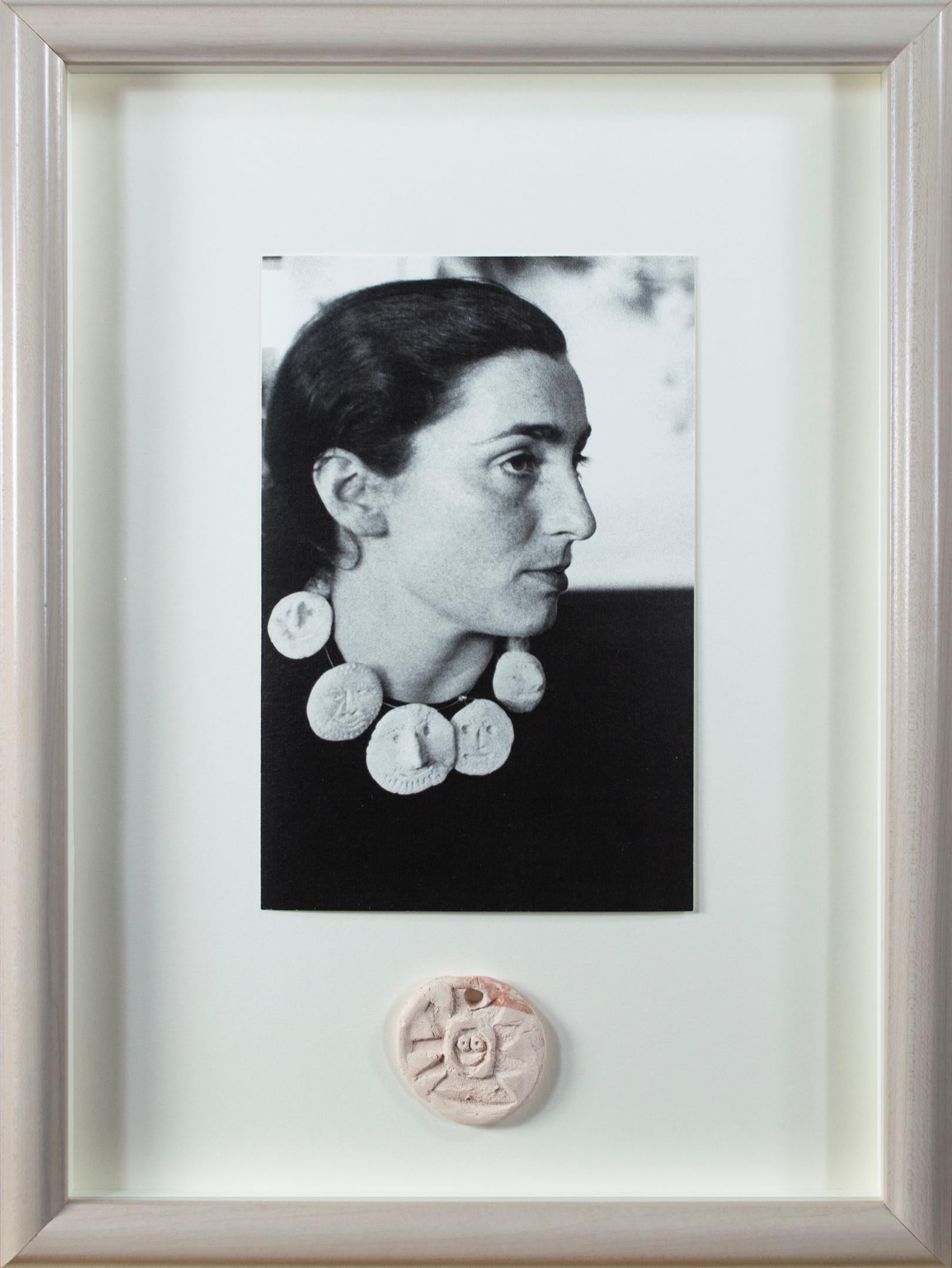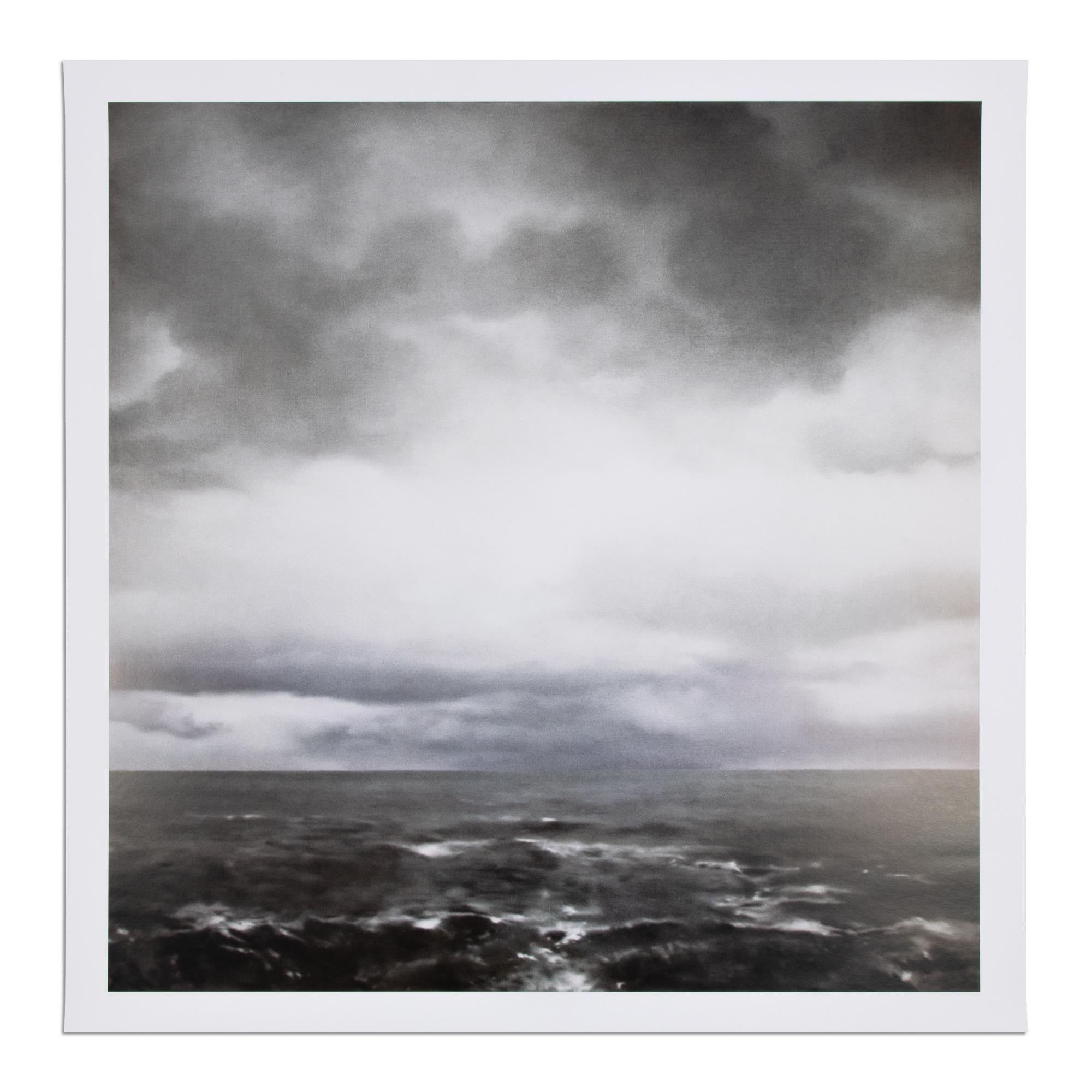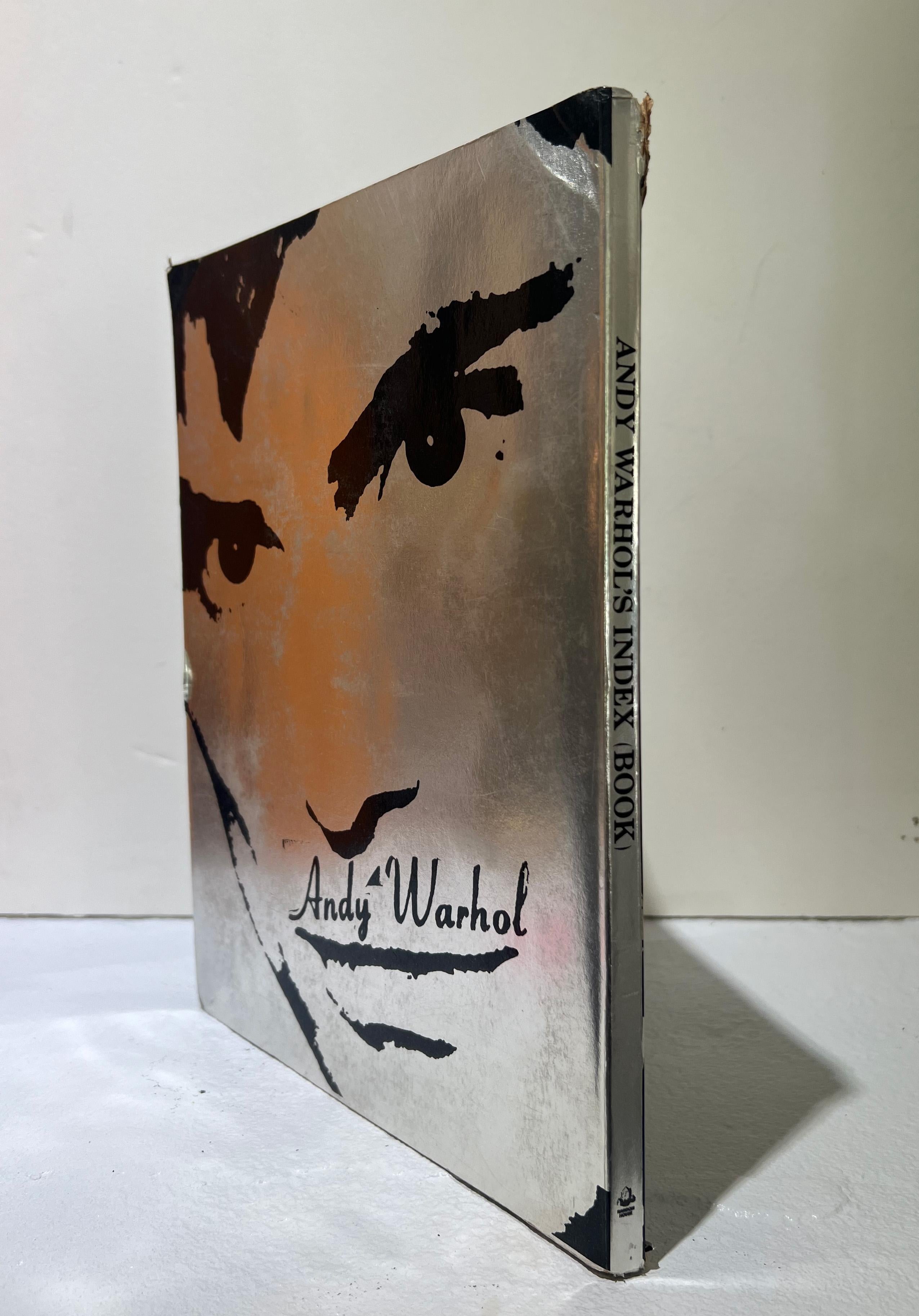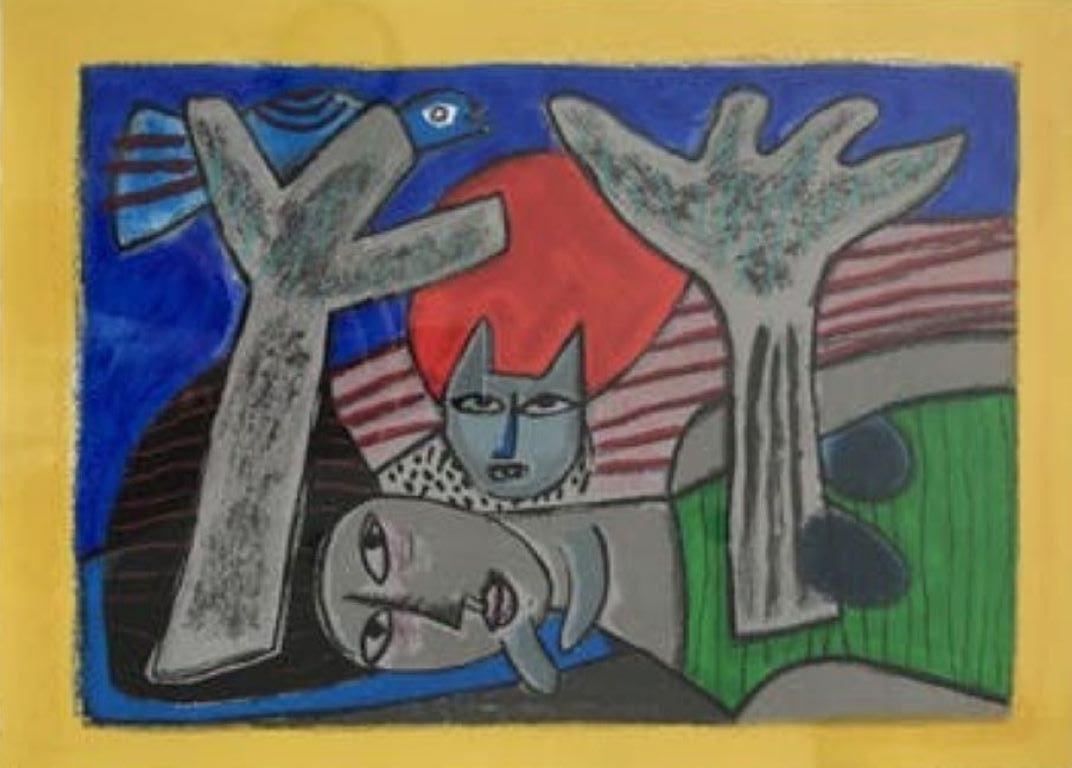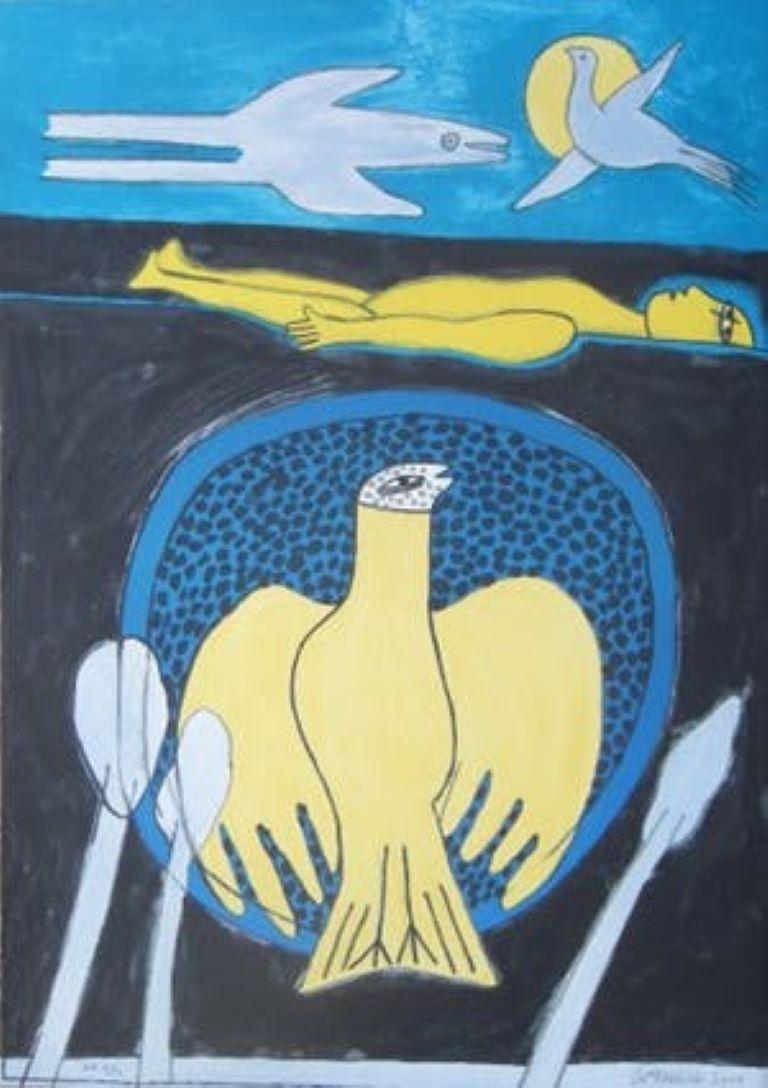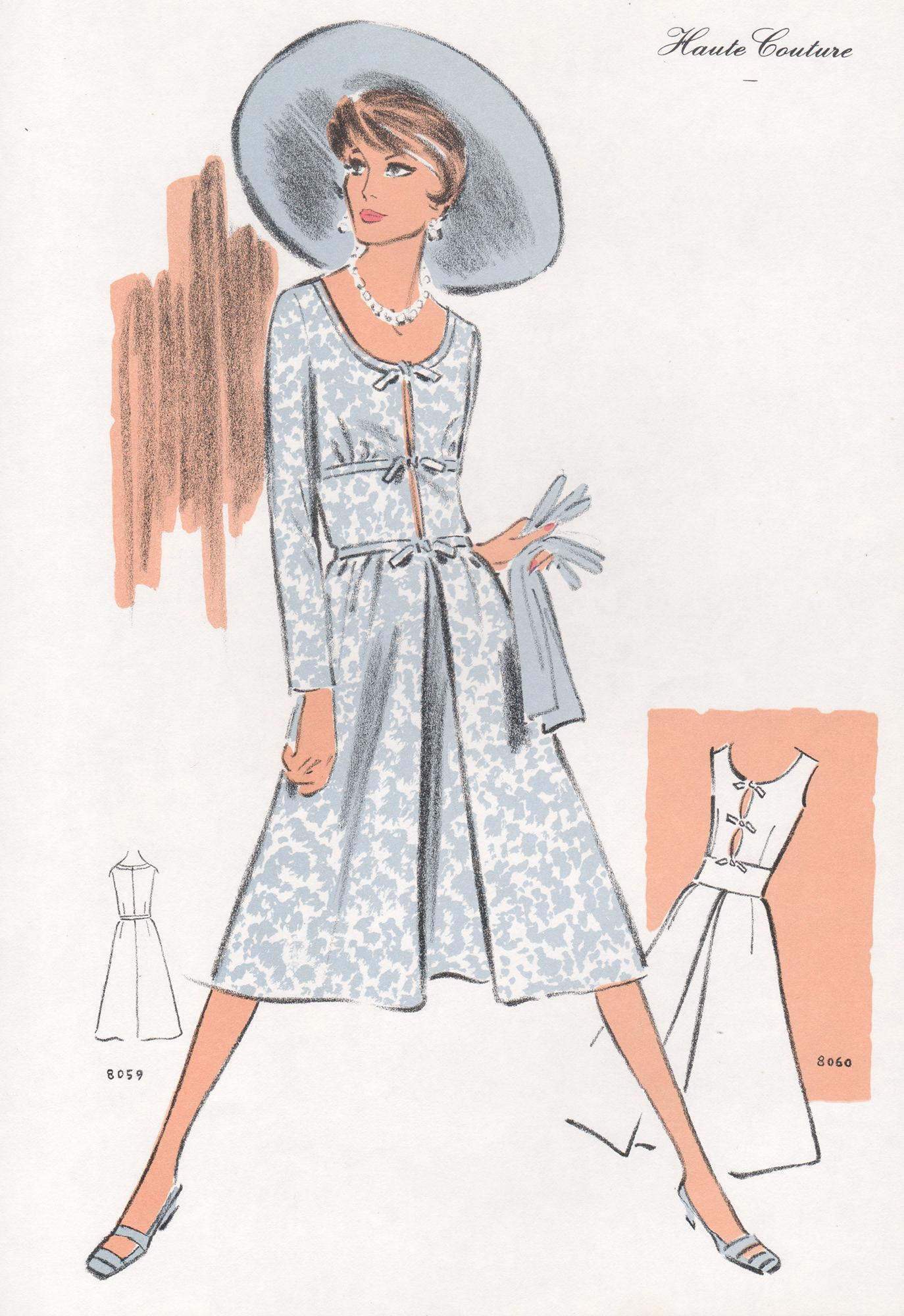Items Similar to "Human Palm", framed black and white print, Berlin 1960s
Want more images or videos?
Request additional images or videos from the seller
1 of 8
Sigmar Polke"Human Palm", framed black and white print, Berlin 1960s1968
1968
About the Item
Sigmar Polke (1941-2010) was one of the most important german artists of the late 20th century. In 1961 he joined with Manfred Kuttner, Konrad Lueg and Gerhard Richter the class of Karl Otto Götz at the Kunstakademie Düsseldorf and these four upcoming artists presented their latest works in an in their own initiative curated exhibition to bring the newest art movements from oversea and Paris to Germany. On the invitation cards they printed the terminologies „Pop Art, Junk Culture, Nouveau Realisme, Common Object Painting, Neo Dada, New Vulgarismus, Antikunst, Know-Nothing-Genre“ and they proclaimed for theirselves to be the first artists to show a indepently grown Pop Art in Germany, not just as a copy or American import.
But Polke showed right from the beginning an ironic distance to the sociocritical style of his combatants, that will run through his entire Ouevre. Influenced by the Fluxus and Neo Dada scene around Joseph Beuys, Daniel Spoerri, Dick Higgins and others in the early 1960s Polke developed is own style characterised by an anarchic mind and esprit. Simliar to the Pop Art Polke searched for the asthetic in the trivial but here too he simoultanesly disavowed the trivial through irony.
Very typical for Polke are the famous grid images, known from newspaper printings, where there are horizontal, uniform lines of small dots and by combining certain dots there arises a form. By using perforated sheets and airbrush he could overlay more monochrome grids to create vibrating images and he often played in the printing process with enforced mistakes and errors to disassemble the firm surface of an image to a process of dekomposition.
Next to irony and anarchy other keywords to his works are heterogeneity, polyperspectivity and multivalent metamorphoses in which every reality could be something possibly different at the same time. A world where everything is connected; not by fundamental unity but by fragmentary dispersion. Because there is no one true reality, he transfers his works in an intermediate state of transformability.
Menschenpalme (Human Palm, 1966)
From the portfolio ".....Höhere Wesen befehlen" (.....Higher beings ordain)
Offset lithograph after photographs by Polke and Chris Kohlhöfer on beige art paper
22.2 x 16 cm (print size)
29.7 x 20.9 cm (sheet size)
44.3 x 35.7 cm (frame size)
Edition of 80 and a few prints outside the complete portfolio
Nr. 6/32 unsigned extra prints, stamped and signed by the editor (Edit. Block)
Cat. Raisonné (Edit. Becker/von der Osten) Nr. 8
The portfolio ".....Höhere Wesen befehlen" was published in 1968 by the Gallery René Block in Berlin. In addition to the edition of 80, they printed also a few extra prints from each motif and in contrast to the largely unnumbered and unsigned editions the extra prints were numbered and stamped and signed by René Block.
The photos in the portfolio are not intended to be simple images of objects in action, but to function as direct carriers of the idea of what is shown. The objects shown do not exist either, but were created for the sole purpose of showing them as photographs. The "Menschenpalme" belongs to a series from 1966 called "Die betende Palme" (The praying Palm) that shows various materials in different states in the form of palm trees made with little effort.
- Creator:Sigmar Polke (1941 - 2010, German)
- Creation Year:1968
- Dimensions:Height: 17.45 in (44.3 cm)Width: 14.06 in (35.7 cm)
- Medium:
- Movement & Style:
- Period:
- Condition:
- Gallery Location:Cologne, DE
- Reference Number:1stDibs: LU134428490912
About the Seller
No Reviews Yet
Recognized Seller
These prestigious sellers are industry leaders and represent the highest echelon for item quality and design.
1stDibs seller since 2020
7 sales on 1stDibs
- ShippingRetrieving quote...Ships From: Cologne, Germany
- Return PolicyA return for this item may be initiated within 14 days of delivery.
More From This SellerView All
- "Blanket", unframed black and white print, Berlin 1960sBy Sigmar PolkeLocated in Cologne, DESigmar Polke (1941-2010) was one of the most important german artists of the late 20th century. In 1961 he joined with Manfred Kuttner, Konrad Lueg and Gerhard Richter the class of K...Category
Late 20th Century Post-War Prints and Multiples
MaterialsOffset, Paper, Lithograph
- "The Correction of the Handlines", unframed black and white print, Berlin 1960sBy Sigmar PolkeLocated in Cologne, DESigmar Polke (1941-2010) was one of the most important german artists of the late 20th century. In 1961 he joined with Manfred Kuttner, Konrad Lueg and Gerhard Richter the class of Karl Otto Götz at the Kunstakademie Düsseldorf and these four upcoming artists presented their latest works in an in their own initiative curated exhibition to bring the newest art movements from oversea and Paris to Germany. On the invitation cards they printed the terminologies „Pop Art, Junk Culture, Nouveau Realisme, Common Object Painting, Neo Dada, New Vulgarismus, Antikunst, Know-Nothing-Genre“ and they proclaimed for theirselves to be the first artists to show a indepently grown Pop Art in Germany, not just as a copy or American import. But Polke showed right from the beginning an ironic distance to the sociocritical style of his combatants, that will run through his entire Ouevre. Influenced by the Fluxus and Neo Dada scene around Joseph Beuys, Daniel Spoerri, Dick Higgins...Category
Late 20th Century Post-War Prints and Multiples
MaterialsPaper, Lithograph, Offset
- "Whip", unframed black and white print, Berlin 1960sBy Sigmar PolkeLocated in Cologne, DESigmar Polke (1941-2010) was one of the most important german artists of the late 20th century. In 1961 he joined with Manfred Kuttner, Konrad Lueg and Gerhard Richter the class of Karl Otto Götz at the Kunstakademie Düsseldorf and these four upcoming artists presented their latest works in an in their own initiative curated exhibition to bring the newest art movements from oversea and Paris to Germany. On the invitation cards they printed the terminologies „Pop Art, Junk Culture, Nouveau Realisme, Common Object Painting, Neo Dada, New Vulgarismus, Antikunst, Know-Nothing-Genre“ and they proclaimed for theirselves to be the first artists to show a indepently grown Pop Art in Germany, not just as a copy or American import. But Polke showed right from the beginning an ironic distance to the sociocritical style of his combatants, that will run through his entire Ouevre. Influenced by the Fluxus and Neo Dada scene around Joseph Beuys, Daniel Spoerri, Dick Higgins and others in the early 1960s Polke developed is own style characterised by an anarchic mind and esprit. Simliar to the Pop Art Polke searched for the asthetic in the trivial but here too he simoultanesly disavowed the trivial through irony. Very typical for Polke are the famous grid images, known from newspaper printings, where there are horizontal, uniform lines of small dots and by combining certain dots there arises a form. By using perforated sheets and airbrush he could overlay more monochrome grids to create vibrating images and he often played in the printing process with enforced mistakes and errors to disassemble the firm surface of an image to a process of dekomposition. Next to irony and anarchy other keywords to his works are heterogeneity, polyperspectivity and multivalent metamorphoses in which every reality could be something possibly different at the same time. A world where everything is connected; not by fundamental unity but by fragmentary dispersion. Because there is no one true reality, he transfers his works in an intermediate state of transformability. Peitsche (The Whip, 1968) From the portfolio ".....Höhere Wesen befehlen" (.....Higher beings ordain) Offset lithograph after photographs by Polke and Chris Kohlhöfer on beige art...Category
Late 20th Century Post-War Prints and Multiples
MaterialsPaper, Lithograph, Offset
- "The Defoliation of a Tree", unframed black and white print, Berlin 1960sBy Sigmar PolkeLocated in Cologne, DESigmar Polke (1941-2010) was one of the most important german artists of the late 20th century. In 1961 he joined with Manfred Kuttner, Konrad Lueg and Gerhard Richter the class of K...Category
Late 20th Century Post-War Prints and Multiples
MaterialsPaper, Lithograph, Offset
- "Glaspalm", unframed black and white print, Berlin 1960sBy Sigmar PolkeLocated in Cologne, DESigmar Polke (1941-2010) was one of the most important german artists of the late 20th century. In 1961 he joined with Manfred Kuttner, Konrad Lueg and Gerhard Richter the class of K...Category
Late 20th Century Post-War Prints and Multiples
MaterialsPaper, Lithograph, Offset
- "Balloon Palm", unframed black and white print, Berlin 1960sBy Sigmar PolkeLocated in Cologne, DESigmar Polke (1941-2010) was one of the most important german artists of the late 20th century. In 1961 he joined with Manfred Kuttner, Konrad Lueg and Gerhard Richter the class of K...Category
Late 20th Century Post-War Prints and Multiples
MaterialsOffset, Paper, Lithograph
You May Also Like
- Picasso Ceramics Exhibition 2012-13 Invitation with pendant by Joan DvorskyLocated in Milwaukee, WIPresented here is an invitation to the Picasso Ceramics exhibition held at the Museu Picasso de Barcelona in 2012-13. The front of the invitation displays David Douglas Duncan...Category
2010s Post-War Portrait Photography
MaterialsPhotographic Paper, Offset
- Gerhard Richter, Seestück (bewölkt): Exhibition PosterBy Gerhard RichterLocated in Hamburg, DEOriginal exhibition poster, based on Gerhard Richter's oil painting "Seestück (bewölkt)" from 1969, measuring 200 x 200 cm. Gerhard Richter (German, b. 1932) Seestück (bewölkt), 196...Category
20th Century Post-War Figurative Prints
MaterialsOffset
- POSTWAR Rare BRILLO Andy WARHOL Index Book Brillo HologramBy Andy WarholLocated in New York, NYAn original hard copy of Andy Warhol's Brillo book. 11.25" h x 8.75" w. Wear consistent with age and use. Some wear at corners, as in the images. Andy Warhol, an American artist,...Category
Mid-20th Century Post-War Prints and Multiples
MaterialsLithograph
- Vrouw met kat en vogel - Cobra, 20th Century, Lithograph, Figurative Print, HCBy Guillaume Cornelis van Beverloo (Corneille)Located in Sint-Truiden, BEGuillaume Corneille Lithograph 40 x 50 cm Hors Commerce HC Gesigneerd Corneille was one of the founders and one of the most important representatives of the Cobra movement. He was a ...Category
Late 20th Century Post-War Figurative Prints
MaterialsLithograph
- Vrouw met duif - Cobra, 20th century, Lithograph, Figurative Print, EABy Guillaume Cornelis van Beverloo (Corneille)Located in Sint-Truiden, BEGuillaume Corneille Lithograph 70 x 50 cm Epreuve d'artiste op 10 exemplaren EA 6/10 Corneille was one of the founders and one of the most important representatives of the Cobra move...Category
Late 20th Century Post-War Figurative Prints
MaterialsLithograph
- French Mid-Century 1970s Fashion Design Vintage Lithograph PrintLocated in Melbourne, VictoriaOriginal colour lithograph of a French fashion design from 'Haute Couture'. Published in a folio of designs for Summer 1971. 32cm by 22cm (sheet)Category
1970s Post-War Figurative Prints
MaterialsLithograph
Recently Viewed
View AllMore Ways To Browse
Simple Vintage Frames
1960s Photo Frame
Vintage Art Nouveau Prints
Vintage Art Nouveau Print
Horizontal Photo Frames
Vintage German Newspaper
Palm Lithograph
Dior Cards
Higgins Vintage
Art Nouveau Cat
Retro Printing Blocks
Art Nouveau Photograph Frames
More Framed Palm Trees
Gerhard Richter Style
Karl Otto
Vintage Airbrush Painting
Monochrome Dior
After Gerhard Richter
